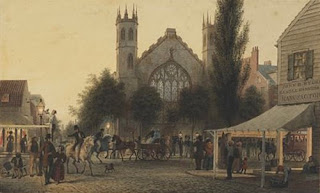"This holy season": an early PECUSA sermon for Advent Sunday
During this Advent, laudable Practice will post extracts Duffie's sermons for the season, beginning with an Advent Sunday sermon. As seen with previous examples of pre-1833 Old High Advent preaching, it is particularly striking to see the sense of the liturgical season. Against this background, Newman's well-known Advent sermon in Parochial and Plain Sermons - and we might note that Newman's sermon is very similar to Duffie's - suggests not a new style of Tractarian preaching but, rather, the continued vitality of Old High preaching and its liturgical spirit.
Duffie's sermon again emphasises that a meaningful observance of Advent was not dependent on later 19th century liturgical developments. The liturgy accompanying Duffie's Advent sermons would have been plain Prayer Book (1789). This does indicate how the sparseness of the liturgy, rather than detracting from the season, can amplify its ethos.
Also worthy of note is the recognition in this Advent Sunday sermon of the approach of the festive season. Indeed, Duffie refers to "our joy at this holy season". In other words, before Victorian Christmas customs, the anticipation of Christmas was evident in December and recognised in the Sundays of Advent.
On this day [the Church] begins her annual course of solemn observances, and taking up the message of him who was sent before the Saviour to proclaim his coming, she calls upon her members to "prepare the way of the Lord".
In fulfilling the ministry with which he was charged - to announce the appearance of the promised Messiah - the Baptist did not merely declare the welcome news, "the kingdom of heaven is at hand," but founded upon this his solemn call to repentance. It is in imitation of his example, that the Church, at this season, enforces the duty of self-examination, of repentance, and amendment of life: and if we consider for a moment the twofold character of the events which this season commemorates, we must perceive that it cannot be a season of unmixed joy, excepting to those who are already prepared - whose loins are girded about, and whose lights are burning, and who are themselves like unto men that wait for their Lord ...
For, my brethren, we are not to limit our view to the glad period of that first Advent of our Lord, in which, in great humility, he came to seek and to save. We are not merely to listen to the voice of that angelic host which proclaims, "Fear not, I bring you good tidings of great joy". We are not merely to hear the gracious words of that compassionate Redeemer and Lord, "I am come, that ye might have life". We are bound to carry forward our thoughtful anticipations to other scenes; to realize that second Advent, when he who once came in lowliness and mercy, shall come again in majesty and in terror; when he shall appear in the clouds of heaven, in power and great glory; when every eye shall see him, and they also which pierced him, and all kindreds of the earth shall wail because of him ...
My brethren, these are considerations which should mingle solicitude with our joy at this holy season, which should fill our minds with thoughtfulness and fear, at least equal to our confidence and our hope, and which should make us listen with attention to the affectionate and earnest injunction, "Prepare ye the way of the Lord".
Amidst vanities and sins, amidst thanklessness and neglect of former invitations, we have been permitted to arrive at that period when the Church is renewing her yearly admonition to us, "that we receive not the grace of God in vain". A season of joyfulness is approaching, and we are called upon to make ourselves ready to participate in those acclamations of praise with which the faithful will hail the coming of their Lord. A mighty Deliverer, the promise of ages, the consolation of Israel, the desire of all nations, and the hope of the world, is about to appear. And well may be addressed to us the language, Repent ye, therefore, and be converted, that your sins may be blotted out, when the times of refreshing shall come from the presence of the Lord.
(The painting is George Harvey, 'Nightfall, St. Thomas Church, Broadway, New York', c. 1837.)




Comments
Post a Comment